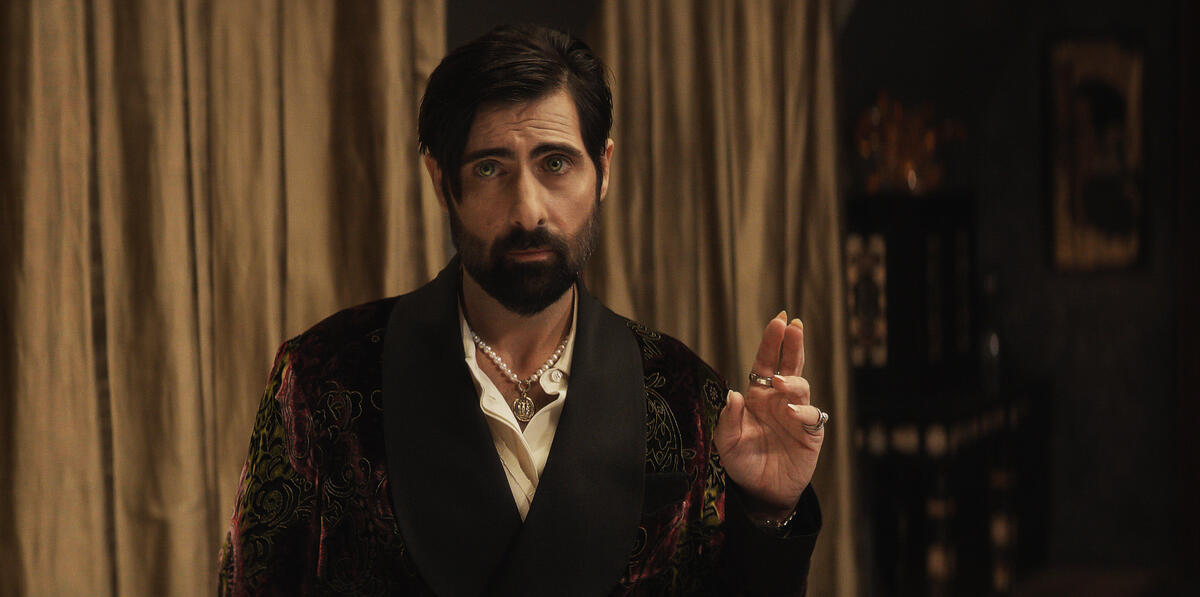AMC has slowly become a dominating force in genre television. From “Dark Winds” to “Interview with the Vampire,” they’ve crafted two series that have already become decade, if not century-defining television. There have been some duds along the way, but it’s undeniable that the writers who helm these series aren’t afraid to take risks, often transforming these shows for the better. Now comes their newest genre venture, “Talamasca: The Secret Order,” which exists within the Anne Rice universe that AMC continues to expand upon.
First introduced in season two of “Interview with the Vampire,” the Talamasca is an organization made up of scholars and spies that watch over the supernatural. While surveilling witches, vampires, and demons, they do everything they can to remain unseen and observe these creatures without interfering with the natural order of things or dying in the process. At the Talamasca’s London headquarters, Helen (Elizabeth McGovern) is sent a severed eyeball in the mail. It belonged to one of her agents, who committed suicide via train while investigating a vampire with a volatile secret buried under the city’s sewers. In need of a replacement, Helen seeks out Guy (Nicholas Denton), a young man with a powerful gift for clairvoyance.
Since he was a child, Guy’s mind has been unable to fully channel his gift, filled with fractured whispers and phrases. To recruit him and to convince him of the Talamasca’s legitimacy, Helen introduces Guy to Burton (Jason Schwartzman), a flamboyant vampire who gives Guy an inkling that he may be more deeply connected to the Talamasca than he was led to believe. While reading a copy of Daniel Molloy’s (Eric Bogosian) novel recounting Louis de Pointe Du Lac’s (Jacob Anderson) story, Guy sees his mother’s name listed in one of the pages. When confronting Daniel later, the newly turned vampire tells Guy he didn’t write that page; the Talamasca did.
With the Talamasca directly linked to the mother he long believed to be dead, Guy decides to join their ranks. What unfolds is a journey that wants to appear more thrilling than it actually is, missing the mark by disregarding ideas of agency and surveillance in the modern world, and how this would stifle the growth of an ancient secret society. Thankfully, halfway through the show’s six-episode run, Guy meets Jasper (William Fichtner), the show’s magnetic antagonist who breathes some much-needed life into the series. Guy goes looking to him for answers, but becomes enamoured by the vampire, who, in turn, seems fascinated by the human.
In the series’s best episode, titled “Wet Work,” Jasper takes Guy under his wing to show him how dark not only the world of the supernatural can be, but the world of the Talamasca. Each of them wants something from the institution Guy now works for, and they manipulate each other to get it, putting each other in harm’s way in the process. Yet there’s a mutual fascination shared between them, which Denton and Fichtner play up in scenes where the two share jabs, but also when they share disarmingly tender moments of understanding.
Fichtner enters each scene with an unprecedented allure, waltzing through his gaudy apartment and the streets of London as if he were born to play a vampire. He gives the series not only the levity it needs but also infuses it with a campiness that should always be at the center of a series about supernatural creatures. Jasper is not only the most interesting character in the series but also one of the most fascinating characters in the three Anne Rice shows AMC has adapted thus far.
When he and Guy share scenes, “Talamasca” becomes a fascinating examination of surveillance and manipulation. But when the series isn’t focusing on their bond, it fizzes out into a run-of-the-mill genre series. For a show that blends both the supernatural and the spy genre, the secrets that various Talamasca agents are attempting to uncover are not interesting enough for either of these genres to soar. Instead, the dynamics that truly fascinate emerge halfway through the series and fade away just as quickly, preventing the series from becoming something worthwhile.
In an age where genre television is becoming a dominating force in the modern TV landscape, “Talamasca” shows incredible promise, although stagnant characters and middling plotlines often hinder its potential. For now, the show exists in a limbo, positioned below AMC’s two knockout series, “Interview with the Vampire” and “Dark Winds,” each of which has completely transformed the horror genre on the small screen. Hopefully, if the series continues, it can provide actors like Fichtner and Denton with material that enhances their captivating performances, rather than being overshadowed by their presence.
Series premieres October 26 on AMC+.
Hence then, the article about william fichtner transforms amc s talamasca into something worthwhile was published today ( ) and is available on Roger Ebert ( Middle East ) The editorial team at PressBee has edited and verified it, and it may have been modified, fully republished, or quoted. You can read and follow the updates of this news or article from its original source.
Read More Details
Finally We wish PressBee provided you with enough information of ( William Fichtner Transforms AMC’s “Talamasca” Into Something Worthwhile )
Also on site :
- KLOS-FM host Uncle Joe Benson, one LA radio’s legendary voices, dies at 76
- Fitness Influencer Lee ‘Malibu’ Markham Admits He Falsely Claimed IED Injury
- OpenAI says Canada mass shooter evaded ban with second ChatGPT account

